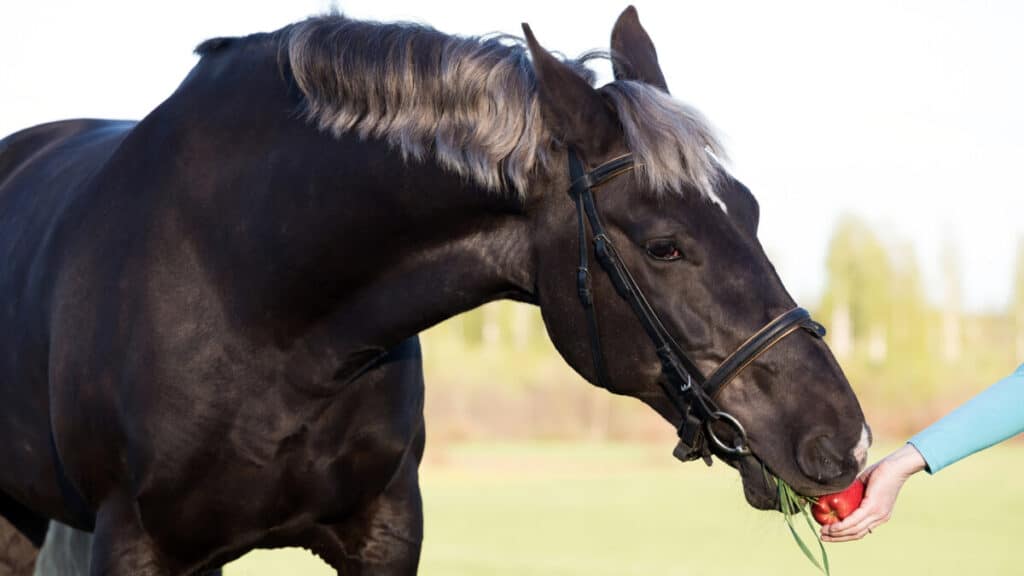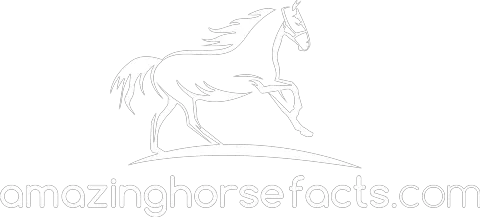Skip To Section
Feeding your domestic horse an apple or carrot a day is a wonderful treat and can even provide much-needed benefits. However, these fruits and vegetables should be not fed to wild horses as it could cause them to become sick.
In this article, we will provide you with the dos and don’ts of feeding carrots and apples to horses. We will explain the benefits of these healthy snacks as well as the risks if they are fed too much. Prepare to pamper your equine friend with a tasty treat!

Can Wild Horses Eat Apples And Carrots?
Wild horses cannot eat apples and carrots as these foods pose multiple dangers to the animal’s health. Both of these foods are choking hazards, but they can also cause colic and ultimately result in a wild horse’s death.
Wild horses love to eat the grasses and herbs that grow in their native habitat – whether that’s the Midwest plains or the beaches of North Carolina.
Can Domestic Horses Eat Apples And Carrots?
Domestic horses can eat apples and carrots if fed in moderation. Common apple varieties that are favored by horses include Gala apples, Red Delicious apples, McIntosh apples, Pink Lady apples, Cortland apples, Golden Delicious apples, Honeycrisp apples, Granny Smith apples, Fuji apples, and Suncrisp apples.
Domestic horses can also eat any variety of carrots including yellow, orange, purple, red, and black. They vary in nutrients and some contain higher concentrations of antioxidants, like purple carrots, thus may be a healthier alternative than other colors.
Fruits or vegetables make good treats for domestic horses as long as you cut them into smaller pieces to avoid choking if they don’t chew well. Other healthy snacks in addition to apples and carrots include snow peas, grapes, strawberries, celery, cantaloupe, bananas, and pumpkin.
If you feed your horse apples and carrots, be sure to limit their snack intake to a few pieces at a time, or else your horse may suffer may intestinal issues or even colic.
Avoid feeding your domestic horse potatoes, brussel sprouts, tomatoes, onions, cabbage, broccoli, and cauliflower and any member of the nightshade family as your horse can suffer from intestinal gas if ingesting these foods.
Apple Benefits
There are great benefits to feeding your horse a healthy apple snack in moderation.
Apples possess antioxidants that provide anti-inflammatory properties.
They are also rich in vitamins and nutrients such as vitamin A, vitamin C, fiber, and potassium that are important to keep a healthy balanced diet for your domestic horse.
Apple Risks
Although apples make a good treat, they should be offered in moderation as too many apples can cause digestive distress which can lead to colic and even death.
Horses with dental issues or those who don’t chew their food well should not eat whole apples as they could choke. Instead, cut the fruit into smaller pieces or even puree it before feeding it to your horse.
Horses that suffer from metabolic diseases like Cushing’s or have insulin resistance should not be fed apples because the high sugar content can worsen the symptoms of these illnesses. Similarly, if your horse has been diagnosed with hyperkalemic periodic paralysis, you should not give your horse apples because the high potassium can further complicate your horse’s issue.
Carrot Benefits
Carrots also have great health benefits for your horse. Like apples, they reduce inflammation by being rich in antioxidants and provide necessary nutrients like fiber, vitamin A, and vitamin C.
Carrots are also low in carbohydrates and sugar which helps cut down on inflammation and keeps your horse healthy.
Carrot Risks
Carrots should be fed to your domestic horse in moderation as too many can lead to digestive issues including colic which can be fatal.
If your horse suffers from hyperkalemic periodic paralysis, do not feed your horse carrots as this can raise its potassium to dangerous levels and trigger an attack.
If your horse has dental issues or doesn’t chew well, carrots may prove a choking hazard so care should be taken to cut the treats up into small amounts.
How Many Apples And Carrots Can A Horse Eat Per Day?
Horses should only be fed up to two carrots or apples per day as their digestive systems may not be able to handle more than that.
Your horse’s main diet should consist of hay and grasses that are easily digestible and maintain a healthy digestive tract.
Too many fruits and vegetables introduce more complex molecules that can be harder to break down and lead to serious digestive problems that may even result in death.
Can Apples And Carrots Kill Wild Horses?
Apples and carrots can prove fatal to wild horses so it is strongly advised to not feed these animals should you encounter them in their natural habitat. Counter to domestic horses which are raised with such treats, wild horses are not privy to the delights of these fruits and vegetables unless introduced through human interaction.
The digestive tracts of wild horses are used to the grasses, herbs, and shrubs which grow in their native habitats such as beaches and plains. If they consume offered apples and carrots, they are highly susceptible to suffering from colic which, if left untreated, can lead to death.
Conclusion
Domestic horses can eat apples and carrots, but these fruits and vegetables should never be fed to wild horses.
While apples and carrots can be a welcome treat for your equine friend, too much of a good thing can make your horse sick and even prove fatal if you’re not careful.
Despite this caveat, if fed in moderation, carrots and apples can provide excellent nutrients and vitamins to supplement your horse’s diet of grasses and hay. Packed with fiber, potassium, and antioxidants these healthy treats can prove a great asset to your horse’s diet.
Make sure to treat your horse with a special carrot or apple treat just don’t overdo it, and you will have a happy healthy partner for life!
